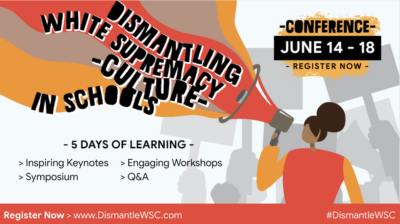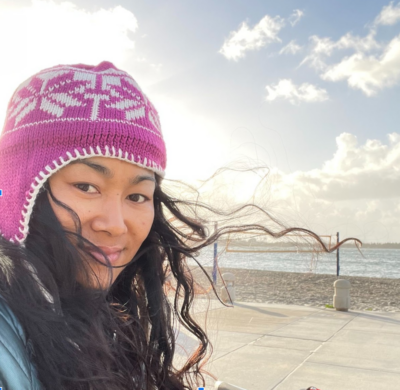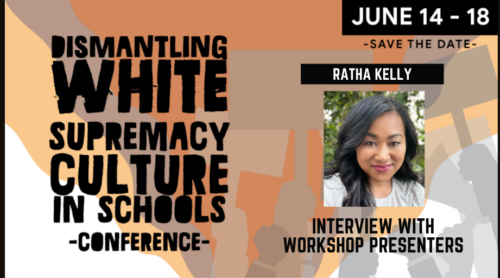How Do We Dismantle White Supremacy Culture? – An Interview with Ratha Kelly, Presenter at DWSC 2021
Find out how we dismantle white supremacy culture from Ratha Kelly, Ethnic Studies Initiative at San Diego Unified School District.
Ratha Kelly is one of our dope workshop presenters at the upcoming Dismantling White Supremacy Culture in Schools 2021 Conference June 14-18th.
Read all the other presenter interviews here: Shane Safir & Jamila Dugan, Matthew Kay, Luz Yadira Herrera & Carla España, Michael Essien, Carolyn Roberts
Register for the DismantleWSC Conference here learn about our presenters below.
Interview with Ratha Kelly
What type of student were you and where did you find joy?
Wow, what type of student was I? This is an interesting question to reflect on. I was a really good student in the sense that I did well in school and knew how to play the game. Never received anything below a B+ until I took AP Calculus where I refused to do the work because I had zero respect for the teacher for lots of different reasons. She had a policy that if you got a 5 on the AP test, she would change your grade to an A, a 4, she would change it to a B. So I proceeded to do zero of the work in her class, but did well on the tests, so I had a “C.” She asked me to join the Math Team to give me extra credit to raise my grade and I refused. I definitely did not want to spend any extra time with her. I told her I would get a 5 on the AP test, and that I did.
School was an interesting experience. I went to my neighborhood school up until I was in 2nd grade. My 2nd grade teacher, Mrs. Tomiyoshi- the only teacher of color I had in all my years of schooling, told my dad that he needed to find a better school for me. I tested for GATE, and applied to several GATE programs in the area. From there, I took a bus to a school in the suburbs with mostly white children from grades 3rd-8th grade. I went to my local High School, but was in the advanced track, again filled with mostly white kids on a mostly brown campus. I never felt like I fit in anywhere- not at home, not at school because I lived amongst different worlds. I found joy through reading, writing and through music. I wrote a lot to process my experiences, that I am now realizing is internalized oppression, and racialization and a desire/proximity towards whiteness. I was afforded great educational opportunities, but it definitely impacted me in terms of developing who I am as a human being, especially as an Asian refugee in American, not first generation, not second generation but 1.5 generation- meaning that I wasn’t born here, but grew up here. This school experience is an experience I carry with me throughout my career in education and impacts many of the decisions I make for my students and colleagues.
What is the most destructive force in schools?
The most destructive force in school is the institution of schooling itself. Schooling, from its onset was designed to assimilate, erase and perpetuate whiteness. From the curriculum, grading structures, assessments, the way we categorize and label schools and students, this idea of “learning loss” etc, it’s all rooted in whiteness and the institution of schooling. Communities and cultures have been learning and educating each other for years before the institution of schooling. How can we get back to centering pre-colonial, ancestral and indigenous knowledge and learning? How can we imagine a different form of schooling for everyone?
As we return back to in-person learning, what should we prioritize?
We need to prioritize the well-being of each individual who is coming into the building- that means students AND adults. Each individual has had varied experiences with the pandemic. We must focus on healing centered, culturally rooted, and justice oriented practices. Our team facilitated a PD for our schools emphasizing the importance to “Press Pause.” Our bodies have experienced so much trauma from the past year and we all need time to heal and process as we are navigating new spaces. We need to give ourselves and each other a lot of grace as we learn new structures, routines and new ways of being with each other in person. “Heal yourself, with beautiful love, and always remember… you are the medicine.” –Maria Sabina
When it gets hard, where do you find inspiration to continue fighting for justice?
I think of a few things. I think of the Lotus Flower- its representation of growth and spiritual enlightenment as well as a beautiful object that grows out of the mud. How can we all be the lotus flower- the beauty out of the mud? It’s there and worth fighting for. I also think of the Great Law of the Iroquois and how our decisions are going to effect seven generations into the future. Liberation may not come while I am here earthside, it may not come while my children are here earthside, but as we all think forward, I think of the impacts of the decisions I make not just on my generation, or my children’s generation, but seven generations to come.
What is the most exciting aspect of your work?
The most exciting aspect of my work is shifting teachers thinking and seeing their transformational change. Applying an ethnic studies lens and pedagogy to all aspects of our lives is truly transformational and healing, as I have seen the shifts and changes in myself and others I have worked with. I think about the students who are in kindergarten who are going to experience schools a little differently, who will see themselves in the curriculum and have their holistic being cultivated. I think about the teachers who have been here for 20+ years, who are open to revamping their curriculum, rethinking Dr. Seuss, and wanting to fill their libraries with diverse books (which is such low hanging fruit, I can’t believe we still have to talk about diversifying libraries). In a recent PD I facilitated on the 7 guiding principles of Ethnic Studies, I asked the question: “Which of the 7C’s (cultivate, celebrate, center, critique, challenge, connect and conceptualize) is most challenging for you to implement?” Her response was something along the lines of, “The most challenging one is ‘challenge’ because it requires that critical self-awareness to understand our own imperialist and colonial mentalities, and an understanding of how we perpetuate white supremacy culture norms. When we understand that, we can begin to challenge it.” That recognition was so powerful and impactful. But truly, the most exciting aspect of the work is the transformation I have seen within myself as I have shifted from being centered in ABAR (anti-bias anti-racism) work to Ethnic Studies Pedagogy. Liberation is possible. All of our liberation is bound together. I can imagine and see this world, and I get to help others imagine and see it too.
What is your favorite book, song or movie of all time? Why?
It’s hard for me to name a favorite book, song or movie of all time as life moves in seasons and all the seasons of our lives are different. Right now, I’m listening to “Bigger” by Beyonce on repeat because I love the message and the words. Books, songs and movies are such powerful artforms that connect to the human soul and spirit. The first time I really felt seen was when I read, “I Love Yous Are for White People: A Memoir” by Lac Su. His memoir focuses on his time as a youth in LA as a Vietnamese refugee. Although my experience did not mirror Lac Su, it was the first time I felt like I could relate to someone else’s lived experience. The second time was when I saw the musical “Cambodian Rock Band” by Lauren Yee. It was the second time I had seen Cambodian culture portrayed on a stage like that. I felt so much connection to the story because the main character is about my age, and I could see so much of myself in her story. I cried during the whole first half. The second half was both painful and healing all at the same time. I will sometimes listen to the soundtrack to connect back to the experience of watching this musical. I experienced both this book and musical as an adult. My hope is that someone wouldn’t have to wait until their 20s and 30s to see themselves reflected in stories of resilience, genius and joy. I think about all the new children’s books filled with Asian stories like “Amy Wu and the Perfect Bao” which is one of my daughter’s favorites, or “Eyes That Kiss the Corners” and the beautiful book, “Drawn Together.” It’s so important for all of us to see our experiences reflected in art.
Register for the DismantleWSC Conference here

About Ratha Kelly
 Ratha Kelly is a mother, friend, and colleague who is fiercely dedicated to antiracism and liberation for all. She has classroom experience in elementary grades, has taught courses to pre-service teachers and has been a coach to many teachers new to the teaching career. Most recently, her experience as an Asian educator navigating a predominantly white space led her to center her Master’s Thesis on the Recruitment and Retention of BIPOC educators. She currently works at the Central Office in San Diego Unified School District on the Ethnic Studies for All, TK-12 initiative.
Ratha Kelly is a mother, friend, and colleague who is fiercely dedicated to antiracism and liberation for all. She has classroom experience in elementary grades, has taught courses to pre-service teachers and has been a coach to many teachers new to the teaching career. Most recently, her experience as an Asian educator navigating a predominantly white space led her to center her Master’s Thesis on the Recruitment and Retention of BIPOC educators. She currently works at the Central Office in San Diego Unified School District on the Ethnic Studies for All, TK-12 initiative.
Links for More Info
http://sdusdethnicstudies.weebly.com/
Find her on instagram @msrathakelly and on twitter @msrathatweets

